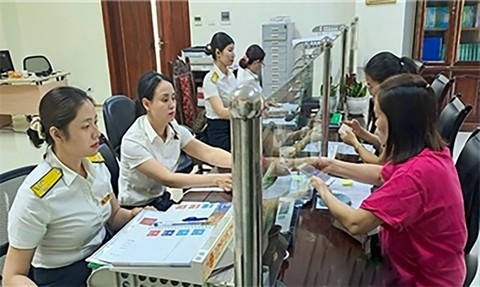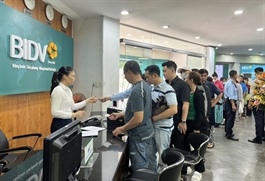Amendment to tax regulation on foreign suppliers proposed
Amendment to tax regulation on foreign suppliers proposed
The Government has recently proposed to amend a regulation of the Law on Tax Administration to better manage tax for foreign suppliers.

Many foreign suppliers take advantage of the double tax agreements to avoid tax obligations. — Photo cafef.vn |
Under the proposal, the Government plans to clear up rules on foreign businesses which have argued that they do not have a fixed base in Việt Nam and are demanding huge tax refunds.
Under the current Clause 4, Article 42 of the law, for e-commerce business, digital-based business and other services of foreign suppliers ‘without having a permanent establishment’ in Việt Nam, the foreign suppliers are directly obliged to or authorise tax registration, tax declaration and tax payment in Việt Nam.
The ministry proposes to remove the phrase ‘without having a permanent establishment in Việt Nam’ in Clause 4, Article 42. The amendment will create many changes in the way that Việt Nam imposes tax on foreign suppliers.
Many foreign suppliers such as Meta, Google and Netflix are requesting Việt Nam’s tax authorities to refund the corporate income tax they paid because they do not have a permanent establishment in Việt Nam.
The amount of tax requested to be refunded is up to thousands of billions of Vietnamese đồng.
Many experts agreed with the Government’s proposal, saying that to ensure fairness among taxpayers as well as the responsibility of foreign suppliers to fulfil their tax obligations to the Vietnamese state, the phrase ‘without having a permanent establishment in Việt Nam’ should be removed.
According to lawyer Nguyễn Duy Nguyên, General Director of Hoàng Giao Law Firm, Clause 4, Article 42 stipulates the principles of tax declaration and calculation for e-commerce business, digital-based business and other services that are performed by foreign suppliers without having a permanent establishment in Việt Nam.
Thus, foreign suppliers with a permanent establishment in Việt Nam will not be directly or authorised to register for tax, declare tax and pay tax in Việt Nam. In this case, the foreign suppliers have the right to only perform the obligation to pay corporate income tax on the portion of profits allocated to permanent establishments according to the provisions of the Law on Corporate Income Tax and the Double Taxation Avoidance Agreement.
Meanwhile, according to the provisions of the Law on Value Added Tax and the Law on Corporate Income Tax, when foreign suppliers conduct e-commerce business, digital-based business and other services in Việt Nam, they are subject to corporate income tax and value added tax. This makes it difficult to collect taxes from foreign e-commerce service providers, such as in the case of online booking service providers Booking and Agoda.
“In my opinion, to create fairness among taxpayers and ensure adequate revenue for e-commerce activities, it is necessary to remove the phrase ‘without having a permanent establishment in Việt Nam’ under Clause 4, Article 42 on tax declaration and calculation principles,” Nguyên said.
The General Department of Taxation (GDT) also believes that retaining the phrase ‘without having permanent establishment’ may no longer be suitable for the current e-commerce business. Online transactions do not require a physical presence such as office, factory or staff in Việt Nam, so determining a permanent establishment becomes more complicated.
According to the GDT, double tax avoidance agreements (DTAs) were signed many years ago, but mainly applied to traditional business activities with a physical presence. Meanwhile, e-commerce business operates mainly in cyberspace, without a physical presence, which causes the application of current tax regulations to become inappropriate.
Economist Dr. Đinh Trọng Thịnh also said the application of DTAs was causing difficulties in determining tax liability. Many foreign suppliers took advantage of the DTAs to avoid tax obligations. This was a concern, especially when corporate income tax from e-commerce transactions could become an important source of revenue for the national budget in the future.
Therefore, Thịnh believes amending the provisions in Clause 4, Article 42 will open up opportunities for tax authorities to manage taxes more effectively. If the phrase ‘without having a permanent establishment’ is removed, tax authorities will have a legal basis to require foreign suppliers doing business in Việt Nam to fulfil tax obligations, regardless of whether they have a permanent establishment in the country or not.
The removal of the phrase ‘without having a permanent establishment’ in the law is a necessary step in reforming the tax system in Việt Nam. This not only ensures the State's right to collect taxes but also creates a clear legal framework for foreign suppliers operating e-commerce businesses in Việt Nam.
























